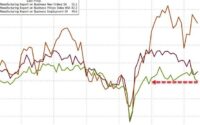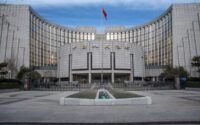Eurozone crisis could return: Top European economist sounds alarm after ECB panic meeting | World | News
Christine Lagarde, ECB President, earlier sounded the alarm that the European economic community could be heading back to dark economic days, with the bank warning of “resurgent fragmentation risks” in a statement. Following the emergency meeting on Wednesday, the ECB pledged fresh measures to limit sell-offs in the bond market.
However, it was criticised for having no concrete plan to assist debt-laden member states, such as Greece and Italy.
Those nations now face borrowing at a higher premium if they want to spend their way out of the crisis, as state bonds become a riskier investment.
However, other nations in the Eurozone with less debt remain able to borrow at a lower rate, fragmenting the euro.
Speaking to German tabloid Bild, Clemens Fuest, President of the Leibniz Institute for Economic Research at the University of Munich, said: “There is a threat of a return of the Euro crisis.
READ MORE: Eurozone crisis: Investors panic as fears explode over fresh debt
“The ECB therefore wants to start helping individual member states financially by limiting interest rate differentials.
“This will lead to new disputes about the limits of the ECB’s mandate.”
The Eurozone crisis began in the late noughties, when several member states – including Spain, Ireland and Cyprus – became unable to refinance their Government debt.
They were kept afloat through bailouts from the ECB and the International Monetary Fund, as well as other EU nations.
Guntram Wolff, from think-tank Bruegel, said: “Only Governments can address the real economic divergence and incomplete setup of the Eurozone.”
But some Governments might not be able to address their economic woes without assistance.
Italian Prime Minister Mario Draghi, a former ECB President, said: “I am not a shield against any event. I am human to whom things happen”.
The ECB suggested it wanted to use pandemic mechanisms to buy Government bonds to keep inflation in member states with high national debt in check.
Jan Schnellenbach, an economist, remarked: “You can see here how much the ECB has got itself into a conflict between monetary policy and helping to finance the state.
“Actually, it should concentrate on monetary policy and leave it to the markets to demand appropriate risk premiums on the Government bonds of individual countries.”
He added that the “fear of an escalation” in countries such as Italy was likely driving the ECB’s sudden desire to intervene in the crisis.
Additional reporting by Monika Pallenberg
[ad_2]
Source link


